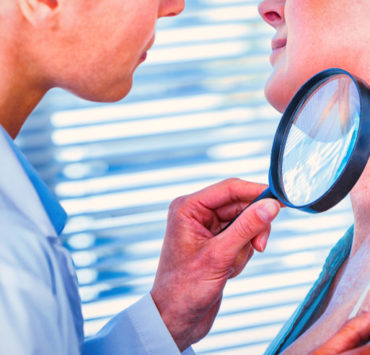Happiness is Loving Your Body – Imperfections and All


Kristen Houghton’s new book, Lilith Angel, was published in April,…
While some people rely on roadmaps or a GPS system I rely on landmarks to get me where I’m going. It’s always been like that for me. When I was dating my husband-to-be he gave explicit directions on how to get to his house.
“You’ll be on south 80 then you’re going to turn onto west 21 and go…” I interrupted him to ask what landmarks I should look for; gas stations, buildings, etc. Having the visual is what I need I told him.
The same approach can apply to physical imperfections. They are the landmarks of living a life. We all desire to be flawless and while there is nothing wrong in wanting to look the best we can, I have to say that I like my flaws. They tell me where I’ve been and how I’ve lived.
A scar that begins at my navel and travels downward is a memory of becoming a mother of twin girls during an emergency C-section. The tiny scar on my nose is a flaw that tells me the MOHS surgery I had for skin cancer was successful. My life isn’t flawless and neither am I, which is good.
A colleague of mine who has visible laugh lines shuns any thoughts of Botox. She says she likes her lines because they show she has laughed quite a lot in her 62 years. That, she says, means she’s enjoyed life. Another friend tells me she wouldn’t trade her imperfect nose because it is a distinctive reminder of her heritage and who she is.
But there is a stigma attached to not being perfect. We’re surrounded by perfection all the time. Society exalts the beauty of celebrities and model-perfect media images. We’re told in a not so subtle manner that perfection of face and form is the desired holy grail. There’s something seriously wrong with anyone who doesn’t strive for outward breathtaking beauty we are told, and somewhere deep in our souls we believe it.
Plastic surgery and weight loss programs are multi-billion-dollar a year businesses catering to those of us who seek to become a bit more perfect than we are. But why should we need to be perfect?
That already miraculously working machine we call a body isn’t good enough. A marvel of perfection as it is, it still gets poked, cut, stretched, bloodied, stitched, and changed to become what we think it should be. We starve it and belittle it to please ‘others’. Unless there is a medical problem most of us show it no respect for years.
At a recent barbecue I met the mother of a two-month-old baby. She had a new mother radiance about her. Everyone around her was complimenting her on how lovely she looked. Yet later in the evening she was telling a group of us how upset she was about gaining weight and how she had decided to have a tummy tuck as soon as possible to get rid of the “ugly flab”. Truth be told, her weight gain was minimal and had simply given her a ‘more womanly’ figure. The stretched muscles were just a part of having given birth and a tummy tuck wasn’t a real necessity. Core exercises to strengthen muscles, sure, but not surgery. Yet not one of us could convince her of that fact. She wanted perfection.
Perfection is overrated. A little imperfection is good for us. Look at a beautiful face in any airbrushed picture and you will see that something is missing. It doesn’t look quite right, there’s nothing unique. There’s a certain amount of perfection in being imperfect, flaws and all.
Renaissance artists such as Michelangelo and da Vinci created masterpieces with flaws. A rounded stomach, a slightly skewed nose showed character and life. Beauty was celebrated in many forms.
Happiness isn’t based on being perfect; if it was, there would be a tremendous amount of miserable people in the world. A big part of happiness comes from loving your body as it is now. We need to find the ‘perfection of imperfection’ in the road map of our bodies and understand that the slightly flawed is more beautiful than the flawless ever could be.
© 2018 copyright Kristen Houghton all rights reserved
 Kristen Houghton is the author of nine novels, two non-fiction books, a collection of short stories, a book of essays, and a children’s novella. Her latest novel, DO UNTO OTHERS, is book 4 in her best-selling series, A Cate Harlow Private Investigation. She is also the author of the Horror Writers of America award-winning Quick-Read, Welcome to Hell.
Kristen Houghton is the author of nine novels, two non-fiction books, a collection of short stories, a book of essays, and a children’s novella. Her latest novel, DO UNTO OTHERS, is book 4 in her best-selling series, A Cate Harlow Private Investigation. She is also the author of the Horror Writers of America award-winning Quick-Read, Welcome to Hell.
She has covered politics, news, and lifestyle issues as a contributor to the Huffington Post. Her writing portfolio includes Criminal Element Magazine, a division of Macmillan Publishing, Hartford Woman, Today, senior fiction editor at Bella Magazine, interviews and reviews for HBO documentaries, OWN, The Oprah Winfrey Network, and The Style Channel.
Author: Kristen Houghton
Kristen Houghton’s new book, Lilith Angel, was published in April, 2019 and is already in the top “fiction top five” by Nielson Ratings. She is the author of nine novels, two non-fiction books, a collection of short stories, a book of essays, and a children’s novella. The first four books in her best-selling series, A Cate Harlow Private Investigation, are now available in a special boxset. She is also the author of the Horror Writers of America award-winning Quick-Read, Welcome to Hell.

Kristen Houghton’s new book, Lilith Angel, was published in April, 2019 and is already in the top “fiction top five” by Nielson Ratings. She is the author of nine novels, two non-fiction books, a collection of short stories, a book of essays, and a children’s novella. The first four books in her best-selling series, A Cate Harlow Private Investigation, are now available in a special boxset. She is also the author of the Horror Writers of America award-winning Quick-Read, Welcome to Hell.



